UWS International Business: Intercultural Competence in Global Markets
VerifiedAdded on 2022/12/29
|5
|944
|83
Essay
AI Summary
This essay delves into the critical role of intercultural competence within the realm of international business. The introduction establishes the definition of intercultural competence, emphasizing its importance in navigating diverse cultural landscapes and fostering effective communication. The main body of the essay provides a detailed analysis of how intercultural competence facilitates successful international business operations, discussing the obstacles that arise without it, such as communication gaps and misunderstandings. It highlights the importance of adapting to different market players, and how intercultural competence helps in maintaining business relationships. The essay also explores the cognitive, affective, and behavioral flexibility needed to thrive in international business, including tolerance for ambiguity and cross-cultural empathy. The conclusion summarizes the key arguments, reiterating the necessity of developing intercultural competence for successful international market engagement and building strong, culturally sensitive business platforms. The essay includes references to academic sources supporting the arguments presented.
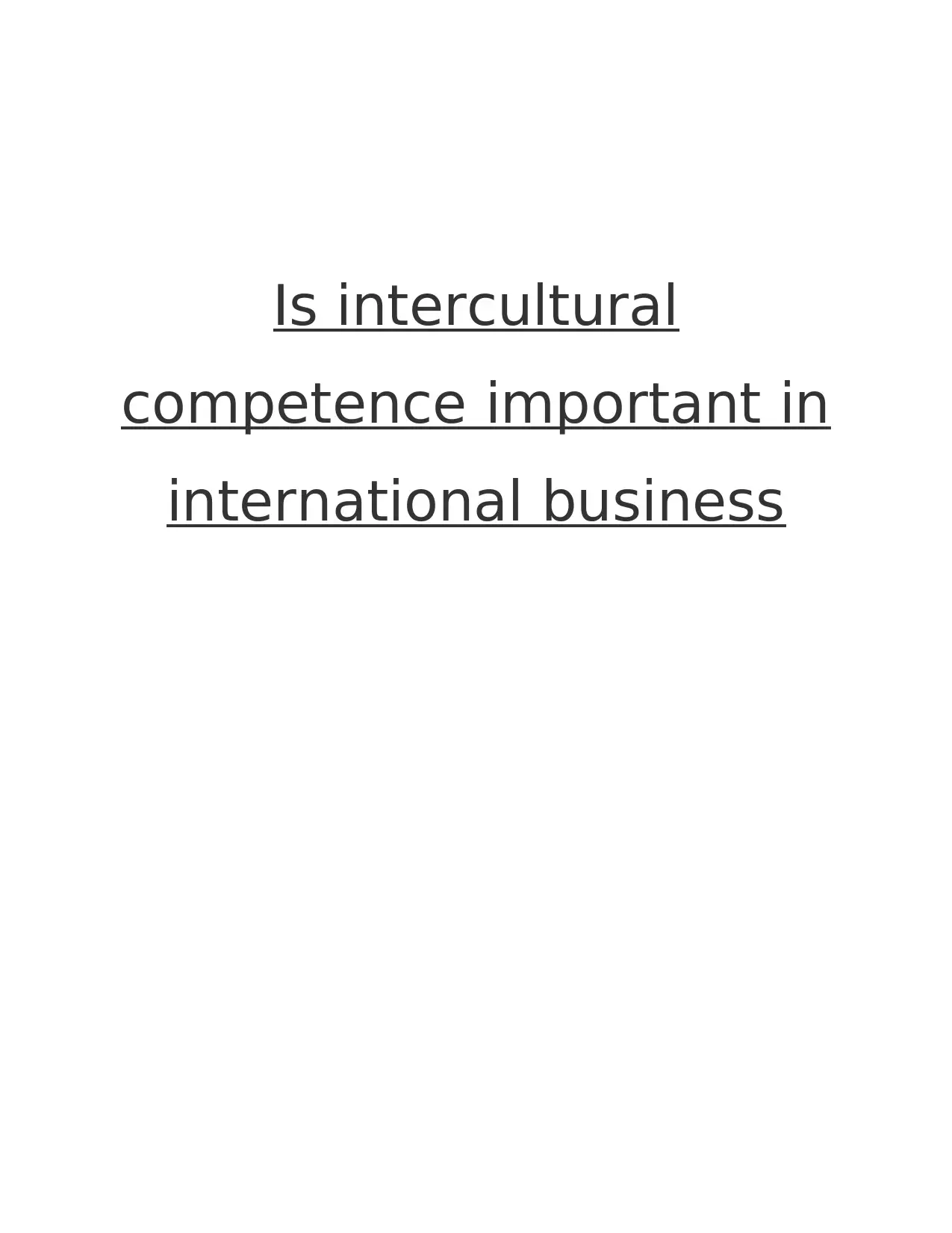
Is intercultural
competence important in
international business
competence important in
international business
Paraphrase This Document
Need a fresh take? Get an instant paraphrase of this document with our AI Paraphraser
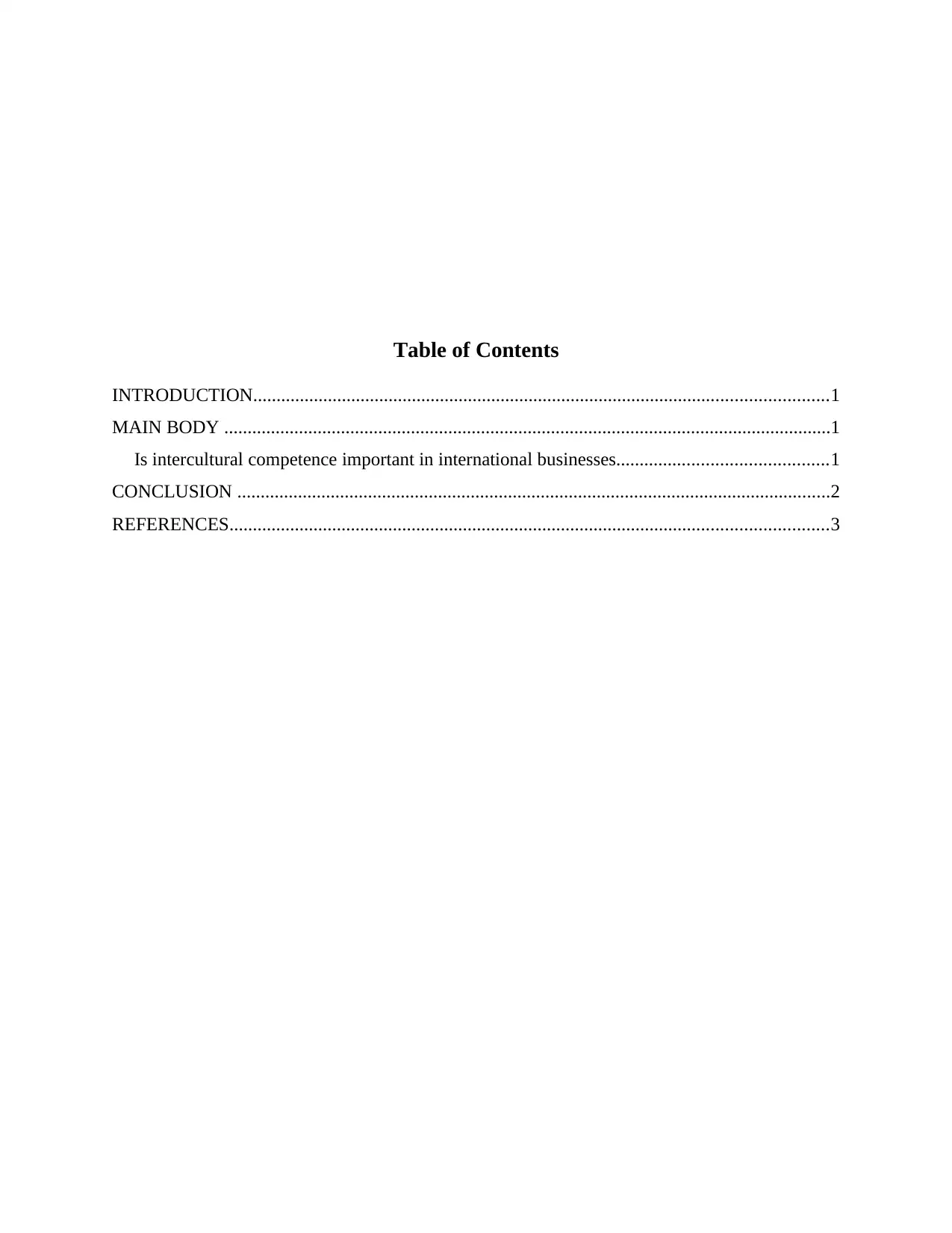
Table of Contents
INTRODUCTION...........................................................................................................................1
MAIN BODY ..................................................................................................................................1
Is intercultural competence important in international businesses.............................................1
CONCLUSION ...............................................................................................................................2
REFERENCES................................................................................................................................3
INTRODUCTION...........................................................................................................................1
MAIN BODY ..................................................................................................................................1
Is intercultural competence important in international businesses.............................................1
CONCLUSION ...............................................................................................................................2
REFERENCES................................................................................................................................3
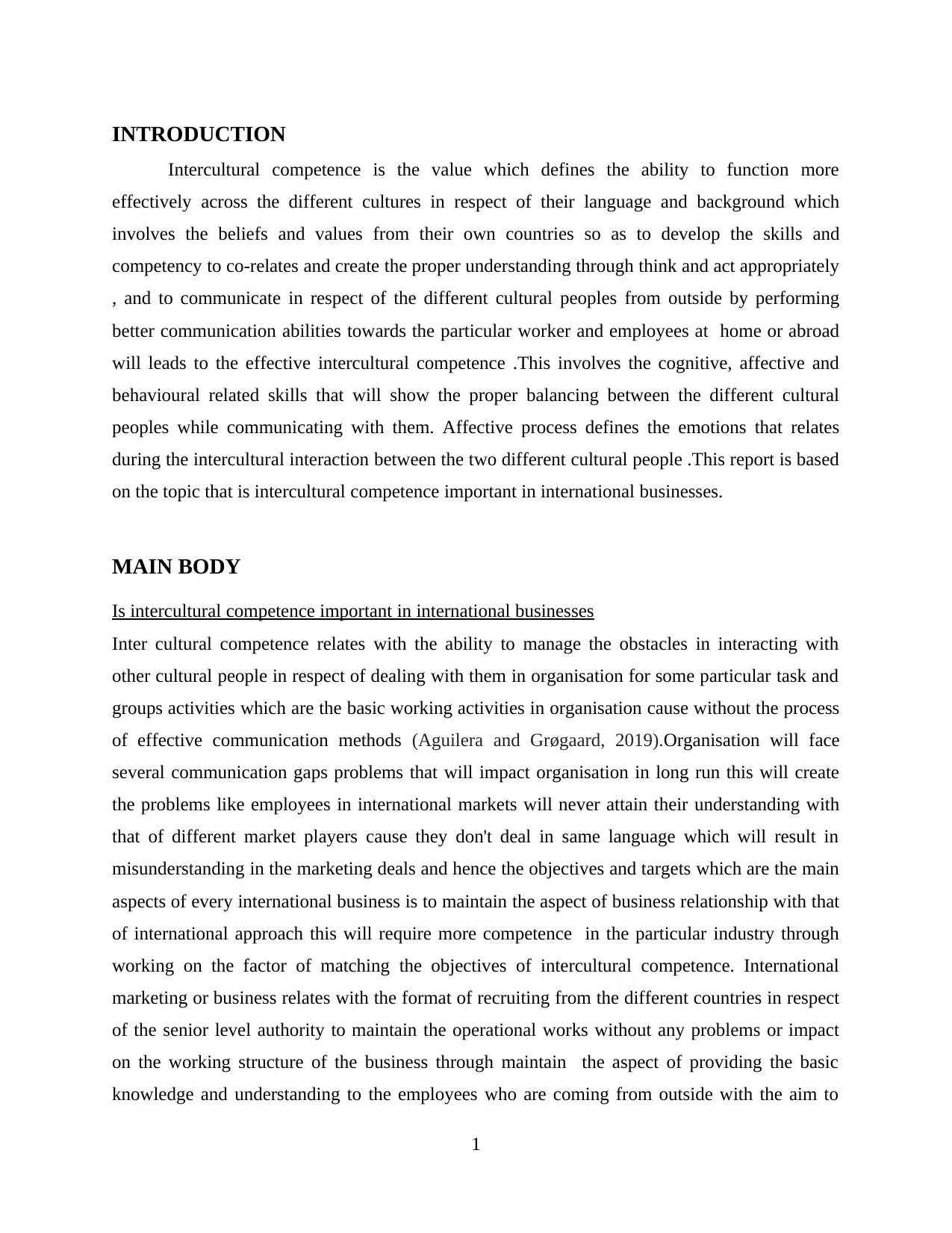
INTRODUCTION
Intercultural competence is the value which defines the ability to function more
effectively across the different cultures in respect of their language and background which
involves the beliefs and values from their own countries so as to develop the skills and
competency to co-relates and create the proper understanding through think and act appropriately
, and to communicate in respect of the different cultural peoples from outside by performing
better communication abilities towards the particular worker and employees at home or abroad
will leads to the effective intercultural competence .This involves the cognitive, affective and
behavioural related skills that will show the proper balancing between the different cultural
peoples while communicating with them. Affective process defines the emotions that relates
during the intercultural interaction between the two different cultural people .This report is based
on the topic that is intercultural competence important in international businesses.
MAIN BODY
Is intercultural competence important in international businesses
Inter cultural competence relates with the ability to manage the obstacles in interacting with
other cultural people in respect of dealing with them in organisation for some particular task and
groups activities which are the basic working activities in organisation cause without the process
of effective communication methods (Aguilera and Grøgaard, 2019).Organisation will face
several communication gaps problems that will impact organisation in long run this will create
the problems like employees in international markets will never attain their understanding with
that of different market players cause they don't deal in same language which will result in
misunderstanding in the marketing deals and hence the objectives and targets which are the main
aspects of every international business is to maintain the aspect of business relationship with that
of international approach this will require more competence in the particular industry through
working on the factor of matching the objectives of intercultural competence. International
marketing or business relates with the format of recruiting from the different countries in respect
of the senior level authority to maintain the operational works without any problems or impact
on the working structure of the business through maintain the aspect of providing the basic
knowledge and understanding to the employees who are coming from outside with the aim to
1
Intercultural competence is the value which defines the ability to function more
effectively across the different cultures in respect of their language and background which
involves the beliefs and values from their own countries so as to develop the skills and
competency to co-relates and create the proper understanding through think and act appropriately
, and to communicate in respect of the different cultural peoples from outside by performing
better communication abilities towards the particular worker and employees at home or abroad
will leads to the effective intercultural competence .This involves the cognitive, affective and
behavioural related skills that will show the proper balancing between the different cultural
peoples while communicating with them. Affective process defines the emotions that relates
during the intercultural interaction between the two different cultural people .This report is based
on the topic that is intercultural competence important in international businesses.
MAIN BODY
Is intercultural competence important in international businesses
Inter cultural competence relates with the ability to manage the obstacles in interacting with
other cultural people in respect of dealing with them in organisation for some particular task and
groups activities which are the basic working activities in organisation cause without the process
of effective communication methods (Aguilera and Grøgaard, 2019).Organisation will face
several communication gaps problems that will impact organisation in long run this will create
the problems like employees in international markets will never attain their understanding with
that of different market players cause they don't deal in same language which will result in
misunderstanding in the marketing deals and hence the objectives and targets which are the main
aspects of every international business is to maintain the aspect of business relationship with that
of international approach this will require more competence in the particular industry through
working on the factor of matching the objectives of intercultural competence. International
marketing or business relates with the format of recruiting from the different countries in respect
of the senior level authority to maintain the operational works without any problems or impact
on the working structure of the business through maintain the aspect of providing the basic
knowledge and understanding to the employees who are coming from outside with the aim to
1
⊘ This is a preview!⊘
Do you want full access?
Subscribe today to unlock all pages.

Trusted by 1+ million students worldwide
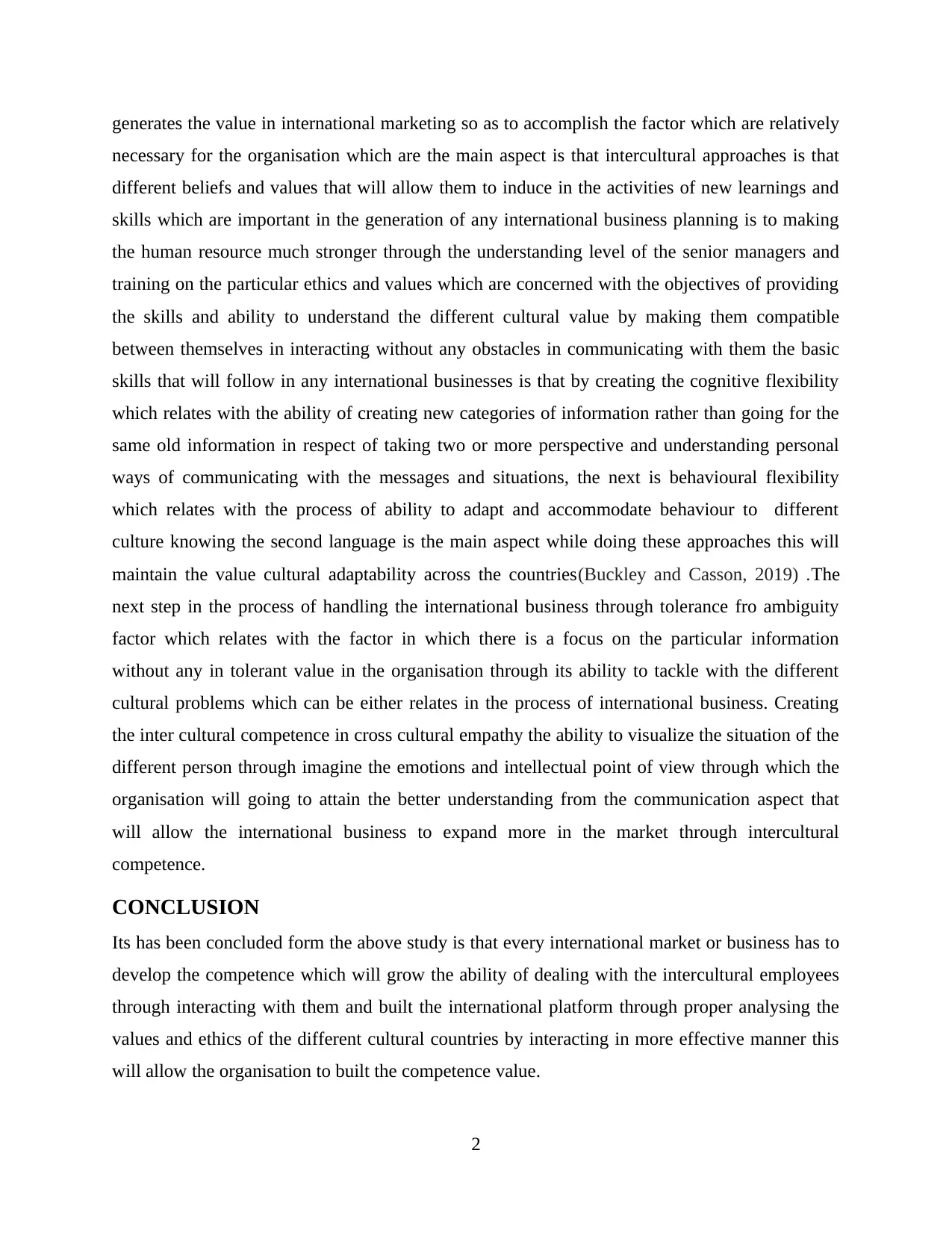
generates the value in international marketing so as to accomplish the factor which are relatively
necessary for the organisation which are the main aspect is that intercultural approaches is that
different beliefs and values that will allow them to induce in the activities of new learnings and
skills which are important in the generation of any international business planning is to making
the human resource much stronger through the understanding level of the senior managers and
training on the particular ethics and values which are concerned with the objectives of providing
the skills and ability to understand the different cultural value by making them compatible
between themselves in interacting without any obstacles in communicating with them the basic
skills that will follow in any international businesses is that by creating the cognitive flexibility
which relates with the ability of creating new categories of information rather than going for the
same old information in respect of taking two or more perspective and understanding personal
ways of communicating with the messages and situations, the next is behavioural flexibility
which relates with the process of ability to adapt and accommodate behaviour to different
culture knowing the second language is the main aspect while doing these approaches this will
maintain the value cultural adaptability across the countries(Buckley and Casson, 2019) .The
next step in the process of handling the international business through tolerance fro ambiguity
factor which relates with the factor in which there is a focus on the particular information
without any in tolerant value in the organisation through its ability to tackle with the different
cultural problems which can be either relates in the process of international business. Creating
the inter cultural competence in cross cultural empathy the ability to visualize the situation of the
different person through imagine the emotions and intellectual point of view through which the
organisation will going to attain the better understanding from the communication aspect that
will allow the international business to expand more in the market through intercultural
competence.
CONCLUSION
Its has been concluded form the above study is that every international market or business has to
develop the competence which will grow the ability of dealing with the intercultural employees
through interacting with them and built the international platform through proper analysing the
values and ethics of the different cultural countries by interacting in more effective manner this
will allow the organisation to built the competence value.
2
necessary for the organisation which are the main aspect is that intercultural approaches is that
different beliefs and values that will allow them to induce in the activities of new learnings and
skills which are important in the generation of any international business planning is to making
the human resource much stronger through the understanding level of the senior managers and
training on the particular ethics and values which are concerned with the objectives of providing
the skills and ability to understand the different cultural value by making them compatible
between themselves in interacting without any obstacles in communicating with them the basic
skills that will follow in any international businesses is that by creating the cognitive flexibility
which relates with the ability of creating new categories of information rather than going for the
same old information in respect of taking two or more perspective and understanding personal
ways of communicating with the messages and situations, the next is behavioural flexibility
which relates with the process of ability to adapt and accommodate behaviour to different
culture knowing the second language is the main aspect while doing these approaches this will
maintain the value cultural adaptability across the countries(Buckley and Casson, 2019) .The
next step in the process of handling the international business through tolerance fro ambiguity
factor which relates with the factor in which there is a focus on the particular information
without any in tolerant value in the organisation through its ability to tackle with the different
cultural problems which can be either relates in the process of international business. Creating
the inter cultural competence in cross cultural empathy the ability to visualize the situation of the
different person through imagine the emotions and intellectual point of view through which the
organisation will going to attain the better understanding from the communication aspect that
will allow the international business to expand more in the market through intercultural
competence.
CONCLUSION
Its has been concluded form the above study is that every international market or business has to
develop the competence which will grow the ability of dealing with the intercultural employees
through interacting with them and built the international platform through proper analysing the
values and ethics of the different cultural countries by interacting in more effective manner this
will allow the organisation to built the competence value.
2
Paraphrase This Document
Need a fresh take? Get an instant paraphrase of this document with our AI Paraphraser
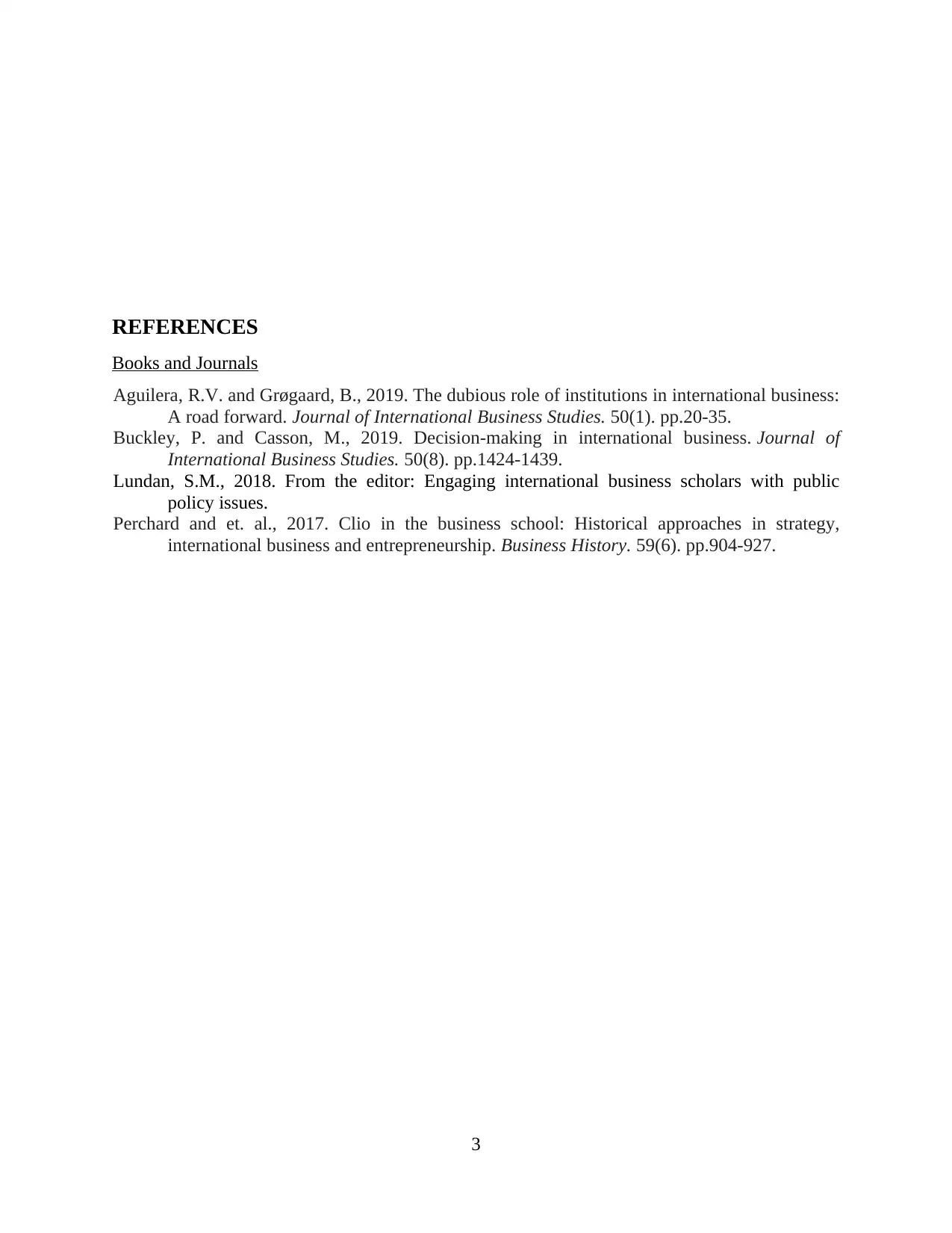
REFERENCES
Books and Journals
Aguilera, R.V. and Grøgaard, B., 2019. The dubious role of institutions in international business:
A road forward. Journal of International Business Studies. 50(1). pp.20-35.
Buckley, P. and Casson, M., 2019. Decision-making in international business. Journal of
International Business Studies. 50(8). pp.1424-1439.
Lundan, S.M., 2018. From the editor: Engaging international business scholars with public
policy issues.
Perchard and et. al., 2017. Clio in the business school: Historical approaches in strategy,
international business and entrepreneurship. Business History. 59(6). pp.904-927.
3
Books and Journals
Aguilera, R.V. and Grøgaard, B., 2019. The dubious role of institutions in international business:
A road forward. Journal of International Business Studies. 50(1). pp.20-35.
Buckley, P. and Casson, M., 2019. Decision-making in international business. Journal of
International Business Studies. 50(8). pp.1424-1439.
Lundan, S.M., 2018. From the editor: Engaging international business scholars with public
policy issues.
Perchard and et. al., 2017. Clio in the business school: Historical approaches in strategy,
international business and entrepreneurship. Business History. 59(6). pp.904-927.
3
1 out of 5
Related Documents
Your All-in-One AI-Powered Toolkit for Academic Success.
+13062052269
info@desklib.com
Available 24*7 on WhatsApp / Email
![[object Object]](/_next/static/media/star-bottom.7253800d.svg)
Unlock your academic potential
Copyright © 2020–2026 A2Z Services. All Rights Reserved. Developed and managed by ZUCOL.





